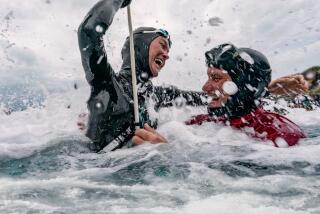Scuba Diving Injuries Pose Challenge to Doctors
- Share via
WASHINGTON — Scuba diving is opening up an underwater frontier to many people but if safety rules are ignored, it could land them in a hospital with medical problems ranging from dizziness to paralysis, or even end in death.
Among the fastest growing of outdoor activities, the number of certified scuba (self-contained underwater breathing apparatus) divers is currently estimated to be at least 750,000 and possibly as high as 1.5 million--up from just 213,000 in 1975.
The dramatic increase in diving has created a greater number of diving injuries and posed a difficult challenge to doctors and nurses, most of whom are not trained to treat such ailments.
In 1987, a total of 557 diving-related injuries were reported to the Divers Alert Network from the continental United States and Caribbean. The network estimates another 50 to 60 injuries occurred in Hawaii.
About 70 to 100 divers die annually, with the predominant cause being heart attack, said Joel Dovenbarger, a registered nurse and medical director of DAN.
“In addition to these reported diving accidents, there is probably a much larger amount of sinus and ear problems, as well as injuries from marine animals,” Dovenbarger says.
Decompression sickness--commonly called “the bends”--and lung expansion injury are the two major problems associated with scuba diving, a University of Mississippi medical team said in a recent article in American Family Physician, a journal and magazine for doctors.
Because water is much denser than air, the pressure on a diver in 33 feet of salt water or 34 feet of fresh water is twice that at sea level. The increased pressure causes proportionately more nitrogen to dissolve in the blood and body tissues.
Decompression sickness occurs when a diver ascends to the surface too quickly and the quick drop in pressure forces the extra nitrogen out of solution, forming bubbles in the bloodstream and tissues, the medical team wrote.
Although Dovenbarger said very few people die of decompression sickness, some forms of the disorder, if untreated, can cause permanent brain damage, paraplegia and incontinence.
The Mississippi researchers said the most common type of decompression sickness is “pain-only” bends, in which nitrogen bubbles cause pain or numbness in joints, particularly the elbows and shoulders.
“Skin bends,” caused by bubbles trapped under the skin, usually is characterized by intense itching or burning sensations, followed by a purplish mottling of the skin. Both skin and pain-only bends are not life-threatening, but can signal more serious types of decompression illness, researchers said.
Another manifestation of decompression sickness, dubbed “the chokes,” involves bubbles in the lungs. Symptoms can include chest pain, shortness of breath and coughing, and if untreated, the condition can lead to circulatory collapse and death, researchers said.
But the most perilous form of decompression sickness affects the central nervous system.
Although “CNS bends” is rare, the condition can mimic spinal cord injury and result in temporary or permanent paralysis, as well as bladder and intestinal problems.
Lung expansion injury generally occurs when divers hold their breath while rising to the surface --something divers are warned never to do, but which they may do impulsively in a panic situation, like running out of their supply of compressed air.
Failure to exhale expanding gases not only can lead to lung collapse, it can trigger a potentially fatal situation in which an air bubble blocks the flow of blood to the brain, researchers said.
Dr. William Replogle, lead author of the article, said many diving-related injuries “could be written off for most anything” unless a doctor knows the patient has breathed compressed air in the past 48 hours.
“Someone who has cerebral involvement decompression sickness and is complaining of back pain might be told to take two aspirin and go home and rest,” said Replogle, who is also an advanced scuba diving instructor.
If a patient has just returned from a vacation with unexplained pains or mottled skin, Replogle says doctors should ask if the patient went scuba diving.
Injured divers who fail to respond to routine oxygen administration, cardiopulmonary resuscitation or other standard emergency treatment must be taken to a hyperbaric chamber, where oxygen is administered at pressures up to three times that of the normal atmosphere, Replogle says.


